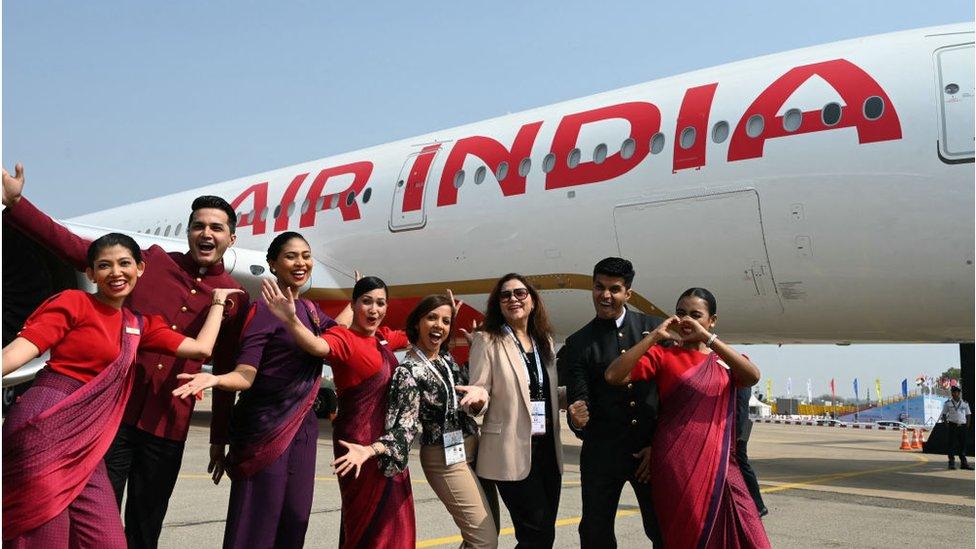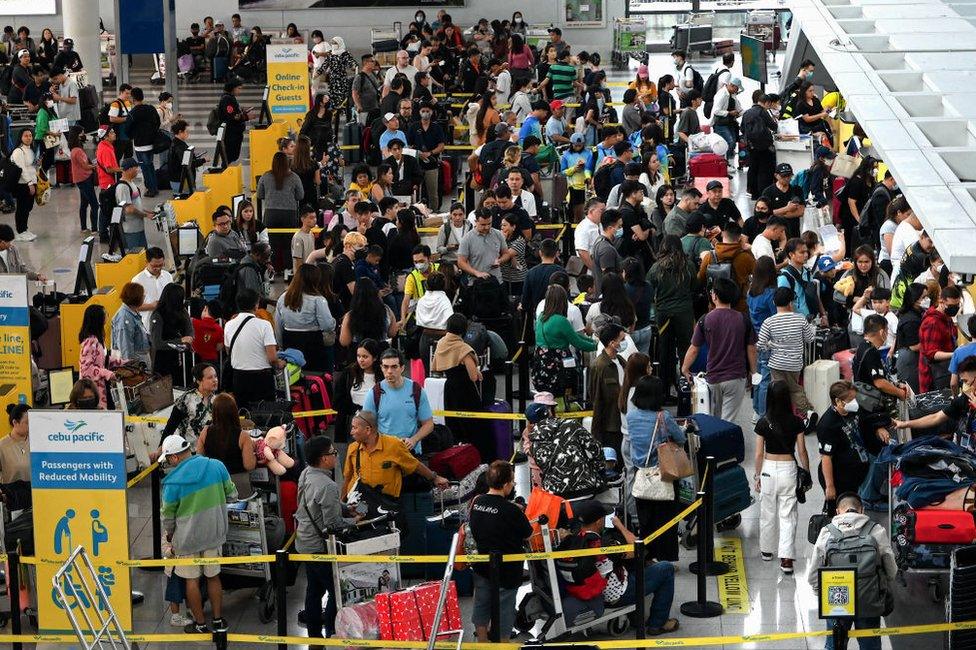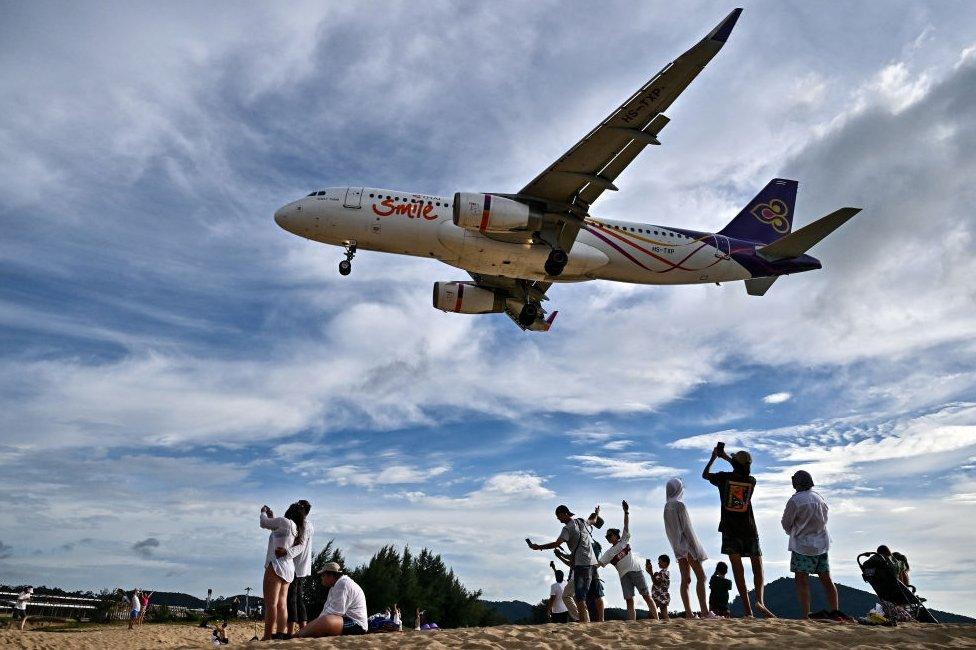Airlines are roaring back in places you might not expect
- Published

Tata Group took over Air India in 2022 and has been investing in new jets, branding and transforming dated systems
When India's Tata Group bought the country's national airline, it was welcomed as something of a miracle.
Air India had been mired in debt and under-funded state management for decades. No-one wanted even a piece of the iconic but loss-making carrier.
But a deal was struck in 2021, just as the world was emerging from the pandemic - and airlines were betting big on revenge travel once borders reopened.
They were right. The rebound is well and truly under way and air travel is off to a roaring start in 2024. There have been warnings of slower growth in the US, where spending is expected to plateau after a post-pandemic spike. But it is a different story on the other side of the world in Asia.
"If we look at the size of the opportunity in India, it's already the world's most populous country," Air India's chief executive Campbell Wilson told the BBC at a recent aviation event in Singapore. "It has the geographic advantage... connecting regions of the world together. And it is a hugely underserved market."
By 2042, India's domestic aviation market is expected to be five times the size it was in 2019, with Indians taking around 685 million trips every year, according to plane maker Airbus, external. That would make the South Asian nation one of the world's fastest-growing civil aviation markets, and third after China and the United States.
It is not just India. By the middle of the century, Indonesia, which now ranks 13th globally in passenger numbers, is predicted to jump to the fourth spot, analysts say. Air travel is also expected to boom in the Philippines, Thailand and Vietnam in the coming decades.
They are all emerging economies with young, growing populations that can afford to spend on travel. And it is showing: global air traffic jumped by 16% over the last year. But in Asia, the increase was almost twice as much, according to industry figures.
Governments in these places are also investing in infrastructure to improve connectivity, which is essential in vast archipelagos like Indonesia and the Philippines.
China, of course, is an obvious market - despite its currently sluggish economy, its travellers have emerged from zero-Covid rules to return to holidaying. Beijing is now offering visa-free travel to citizens of certain countries and some nations, like Thailand and Singapore, are reciprocating.
"We are pleased that people are beginning to travel out of China. It is probably one of the last countries to come back big in travel," says Glenn Fogel, chief executive of online travel agency Booking.com.
But airlines are looking for alternative markets because of China's slowing economy, the uncertainty of doing business there and a fall in consumer spending.

The Philippines one of the the fastest-growing markets for air travel
Enter the Philippines.
"Asia is a very exciting place to be - the Philippines is one of the most exciting places to be. Great opportunity there," says Michael Szucs, chief executive of the Philippine budget carrier Cebu Pacific.
The airline struggled through the pandemic without government support. And like many competitors around the world, it is also facing groundings over faulty Pratt & Whitney engines.
But it has seen a revival in the last two years, expanding and cornering more than half of its domestic market. A new Philippine government is also helping - it is privatising the international airport in Manila and plans to add runways throughout the archipelago to receive larger and more aircraft.
Mr Szucs has high hopes for the country of around 115 million people, where per capita spending is rising: "We've got an increasingly educated population that is relatively young, it's growing, with an increasing propensity to travel."
India, on the other hand, is a trickier market to conquer. Air India faces a stiff domestic rival in Indigo, and a daunting challenge in matching Emirates and Qatar Airways, which regularly rank among the world's best airlines.
But the successful salt-to-software conglomerate Tata has started to turn the ailing carrier around. The company has already spent millions of dollars investing in new planes, new branding and restructuring old and inefficient systems.

South East Asia has returned as a regional rather than global hub
Now it wants to consolidate its five airlines - three Air India subsidiaries, and two joint ventures, Air Asia India and Vistara (with Singapore Airlines). The goal: a highly regarded airline for international flyers, and a reliable low-cost option for domestic passengers.
Mr Wilson hopes to restore Air India's glory - it was India's first airline, started by the Tatas in the 1930s and rebranded as Air India and nationalised in the 1950s. He believes winning the international market is key but will need "connecting more cities around the world nonstop with India" - and that will involve starting more routes and, of course, buying more aircraft.
The company has already gone on a buying spree. It ordered more than 200 Boeing Max 8 and Max 10s in one of the largest airline deals in aviation history. But the Max family of planes is under scrutiny since a door plug blew off a 737 Max 9 plane mid-flight in the US, sparking concerns about the already delayed Max 10 model. This was after two deadly crashes in 2018 and 2019 because of flawed flight control software. The crisis at Boeing over its safety record has also seen the resignation of its chief executive Dave Calhoun.
"When we have concerns, we raise it at the highest levels, including with Boeing," Mr Campbell said.
Mr Wilson sees Air India's future in turning India into a global transit hub, much like Dubai or Singapore.
That might be a challenge given that some long-haul routes, especially to Europe, are yet to be reinstated after the pandemic. Meanwhile, travellers in these countries are choosing to fly within East and South East Asia, driving up air traffic in the region.
But that could also be an opportunity for Air India, and for Delhi given that some South East Asian capitals are lagging behind other international aviation hubs like Singapore, Hong Kong and Dubai.
The industry, however, is upbeat because the pandemic is over, people are flying again and economies are bouncing back.
"The fact is people like to travel," Mr Fogel said. "As long as economies are growing, we know that travel is going to grow a little bit faster. And our job is to try and get a bigger part of that growing pie."